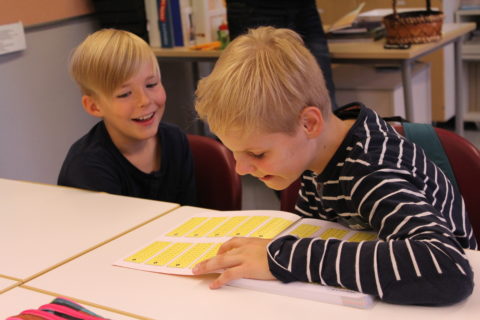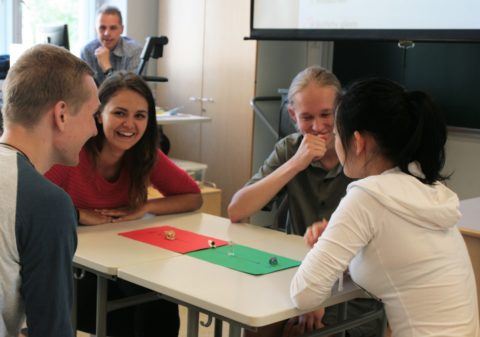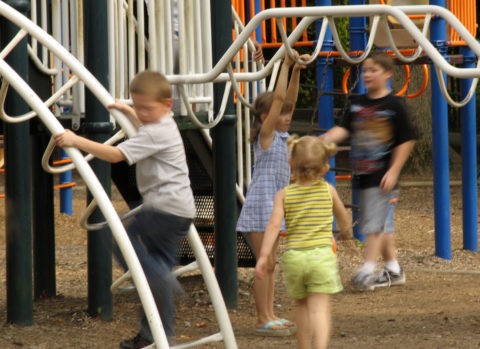Finland’s Core Curriculum: Skills or Knowledge? Or Both?
Last week I was training international education experts from USA, Saudi Arabia, India, New Zealand etc. about Finland’s new core curriculum. In the beginning of the training I asked them: “How many of you have heard that Finland is getting rid of school subjects in the new national curriculum?” Many participants raised their hands.
There has been astonishing headlines over this topic: “Finland Will Become the First Country in the World to Get Rid of All School Subjects”, see for instance here.
 These revolutionary headlines have also raised international concern, if “Finland is throwing away everything that made its schools the best in the world”. For instance Swedish professor Inger Enkvist (professor in Spanish literature) has been very worried that Finland is taking a wrong direction now. As much as we appreciate the concern and intrest towards our national curriculum reform, many commentators have obviously not checked the facts.
These revolutionary headlines have also raised international concern, if “Finland is throwing away everything that made its schools the best in the world”. For instance Swedish professor Inger Enkvist (professor in Spanish literature) has been very worried that Finland is taking a wrong direction now. As much as we appreciate the concern and intrest towards our national curriculum reform, many commentators have obviously not checked the facts.
Once again, the headlines are more incredible than reality. Finland started implementing its new national core curriculum last August, and maybe as a disappointment to many, the core curriculum still has school subjects. In Finland’s new core curriculum you can read, what Finnish students are supposed to learn in mathematics, English, physics, biology, history, Finnish, Swedish, chemistry, art, physical education, music, home economics, other foreign languages, crafts, environmental studies, religion, ethics, social studies, geography, health education, guidance counceling etc. You can check this yourself by ordering Finland’s new national core curriculum in English.
So what is this buzz all about? It is the fact that Finland is changing the way we teach different school subjects.
It’s not that we don’t have any teacher-led traditional teaching in Finland anymore. But the new curriculum emphasizes, that we have to use also versatile, activating teaching and learning methods. It’s not always the teacher who provides the information, but students learn how to search information themselves, how to evaluate it and how to apply it into new situations. Students are encouraged to investigate and innovate things themselves too by using different learning methods and learning environments.
 In Finnish new national core curriculum there is also a strong tendency to combine different school subjects, e.g. the same phenomena can be studied from different perspectives of different school subjects at the same time. For instance if studying the time Finland got its independence in 1917, it’s fruitful to understand the historical movements of the time (history) and how the societal changes of that time were reflected in the literature (Finnish language), art and music, instead of studying these things separately from each other. Combining the perspectives of different school subjects helps the students to understand the phenomena better.
In Finnish new national core curriculum there is also a strong tendency to combine different school subjects, e.g. the same phenomena can be studied from different perspectives of different school subjects at the same time. For instance if studying the time Finland got its independence in 1917, it’s fruitful to understand the historical movements of the time (history) and how the societal changes of that time were reflected in the literature (Finnish language), art and music, instead of studying these things separately from each other. Combining the perspectives of different school subjects helps the students to understand the phenomena better.
How this is actually carried out, may differ in different schools and different cities. The local education providers, schools and teachers have a high degree of freedom in implementing nationally set objectives. They may develop their own innovative methods, which can differ from those in other municipalities or schools.
The core curriculum also states that pupils should participate each year in at least one multidisciplinary learning module. These modules are designed and implemented locally. The core curriculum also states that the pupils should be involved in the planning. During these phenomenon-based project studies e.g. different collaborative classroom practices, where pupils may work with several teachers simultaneously can be applied.
Some commentators have stated that Finland is abandoning the knowledge and focusing on the skills only. That could not be more far from the reality. In Finland we don’t even understand why we should choose between those two. In fact, it is impossible.
 Teaching knowledge and skills are intertwined. It is a huge misunderstanding to think that we don’t teach skills in traditional teacher-centered teaching. Of course we do! The most important skills you learn in traditional teaching (the teacher is talking and the students are listening) might be sitting still and trying to be focused. Sometimes these skills can be useful, but are they really the key competencies and skills people must master in the 21st century?
Teaching knowledge and skills are intertwined. It is a huge misunderstanding to think that we don’t teach skills in traditional teacher-centered teaching. Of course we do! The most important skills you learn in traditional teaching (the teacher is talking and the students are listening) might be sitting still and trying to be focused. Sometimes these skills can be useful, but are they really the key competencies and skills people must master in the 21st century?
The key issue is to understand that while we teach certain subject and content we also teach skills at the same time, too. So why not to teach the core issues and contents needed in the modern world and future AND learn useful skills at the same time? In Finland it is widely acknowledged that the key skills in future are ability to search for information, evaluate and apply it into new situations, problem-solving skills, ability to collaborate with other people, etc. Why not to teach these vital skills at the same time when conveying the important contents and facts as well?
And this is the core of the curriculum reform in Finland: we still take good care that our children master the information and knowledge needed in today’s world. But we also try to make sure that they have the skills to develop the society and the global community, and cope in the unpredictable situations the future may bring them.
-Johanna
